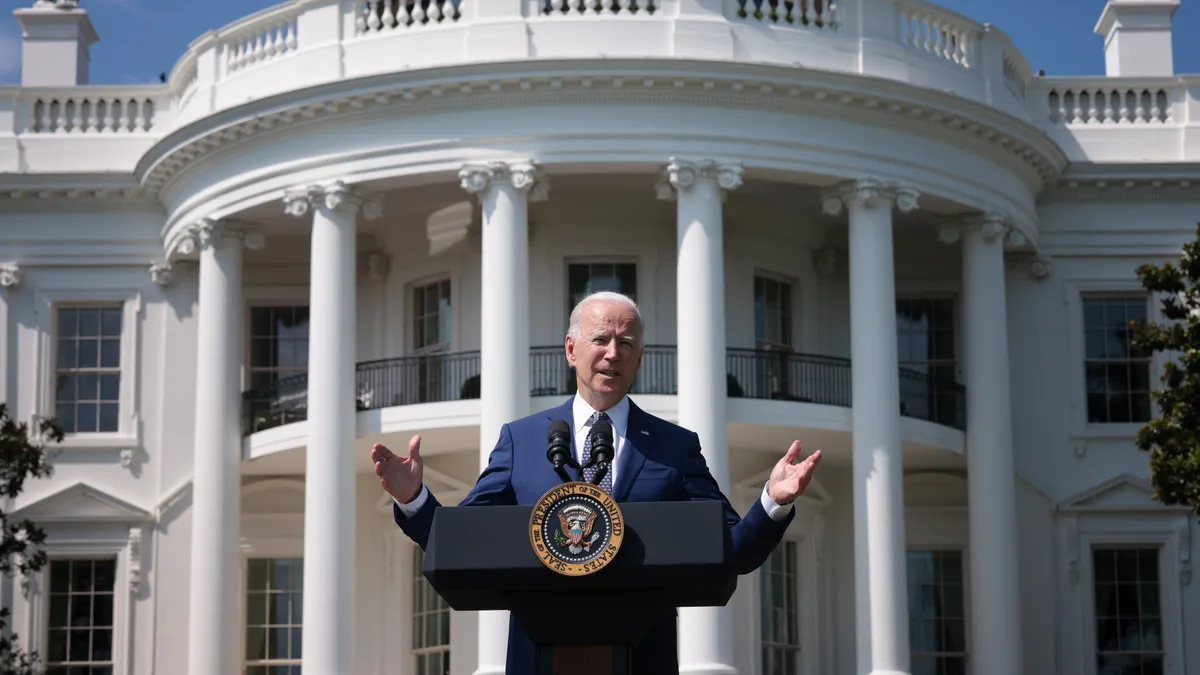Dive Brief:
- A bill President Joe Biden signed Friday would extend to 10 years the statute of limitations for fraud charges to be brought in connection with Paycheck Protection Program (PPP) loan applications.
- Prosecutors already have a 10-year time frame to file federal bank fraud charges. Wire fraud charges involving a loan application to a nonbank, however, had a five-year window. The PPP and Bank Fraud Enforcement Harmonization Act pushes that to 10.
- The bill puts fintech-backed loan applications on equal footing with those from banks. Researchers at the University of Texas, Austin, last year found fintech lenders were almost five times more likely to be linked to suspicious PPP loans than were traditional banks.
Dive Insight:
A second bill Biden signed Friday — the COVID-19 EIDL Fraud Statute of Limitations Act of 2022 — gives prosecutors 10 years to file fraud charges connected to loan applications from the Economic Injury Disaster Loan program.
At least 10% of PPP and EIDL applicants may have obtained loans "that were inconsistent with income eligibility requirements," Justice Department Inspector General Michael Horowitz told Congress in June, according to American Banker.
“The Small Business Administration, in sending that money out, basically said to people, ‘Apply and sign and tell us that you’re really entitled to the money,’” Horowitz told NBC in March. “What didn’t happen was even minimal checks to make sure that the money was getting to the right people at the right time.”
The UT-Austin study, released in August 2021, scoured more than 10 million PPP loans for potential red flags such as unregistered businesses, multiple businesses at one residential address, abnormally high implied compensation per employee, and large inconsistencies in jobs reported with another government program.
The researchers found nine of the 10 lenders with the highest rates of suspicious PPP loans were fintechs.
“It’s indisputable that the fintechs had a greater percentage of loans that were done, that shouldn’t have been done, whether it was because of ineligibility reasons, fraud or what have you,” Chris Hurn, CEO and founder of Fountainhead Commercial Capital, told Banking Dive this year. “And some of that goes to the technology they had and that lack of experience of actually underwriting commercial loans. That’s just the reality of it. It’ll be a bit of an uphill battle for them to overcome that in the near term.”
The PPP bill’s sponsor, Rep. Nydia Velázquez, D-NY, said the measure will give law enforcement agencies more time to “bring these bad actors to justice."
"Anyone that took advantage of a once-in-a-lifetime economic and public health crisis to enrich themselves must be held accountable," Velázquez said in a written statement seen by American Banker.
The Justice Department has brought more than 1,000 pandemic relief-related cases concerning losses of more than $1.1 billion.
"Too much of small-business relief funding, which was passed by the Congress, ended up in the hands of those who either didn't need it, or criminal syndicates who outright stole the money," Biden said Friday.
From a consumer perception standpoint, however, the fraud-related news regarding fintechs and PPP may fade from most people’s memory, said Michael Brauneis, a managing director at consulting firm Protiviti.
“I don’t see this doing long-term damage to the fintech industry as a whole,” Brauneis said. “I do think, though, overall, it’s an industry that is definitely experiencing both the benefits and the challenges of growing up.”












